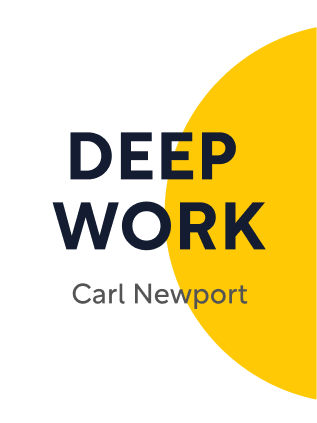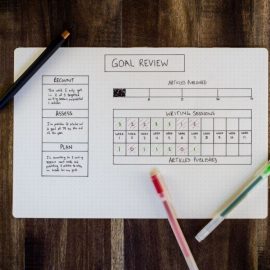

This article is an excerpt from the Shortform book guide to "Deep Work" by Cal Newport. Shortform has the world's best summaries and analyses of books you should be reading.
Like this article? Sign up for a free trial here .
Are you easily distracted when you’re trying to be productive? Are you interested in practicing deep work but don’t know where to start?
This guide will teach you how to do deep work and what the basic principles are. Apply these lessons to your life and watch your productivity start to increase.
Keep reading for advice on how to do deep work.
How to Do Deep Work
When you’re trying to be productive, are you easily distracted by wandering thoughts or urges? Do you wish you could focus better, spending hours more per day driving toward your most important goals? If you want to know how to do deep work, you have to develop your focus and resist distractions. Focus is like a mental muscle – you need to structure training sessions and push yourself to your mental limit to increase your focus capacity. Implement the strategies in this Deep Work summary, and you’ll be more productive than you’ve ever been.
Principles of Deep Work
- Deep work is focused, uninterrupted, undistracted work on a task that pushes your cognitive abilities to their limit.
- The best ideas and the most meaningful progress come from deep work, not shallow work.
- Shallow work answers emails, produces reports, and flits from meeting to meeting.
- Deep work creates breakthrough business ideas, exposes new research questions, and solves complex problems.
- Deep work is critical for your performance as a knowledge worker. It helps you develop new skills and employ those skills to produce output. If you can do both more effectively than others, you will take a leading position in the “information economy.”
- You have two challenges:
- Develop your ability to focus more intensely and for longer periods.
- Develop your ability to resist distractions
- The ability to concentrate must be trained like a muscle. You can’t use it if you haven’t trained it. But if you train it in a structured way and push yourself to your limit, it will get stronger.
- Every time you get distracted and indulge the distraction, you weaken your ability to focus and to resist distractions. If you check your phone every time you get bored, you reinforce your brain’s rewiring to be addicted to distraction.
- Furthermore, the switching cost is high (taking more time to get back on task), and you retain some mental residue from whatever distracted you.
- Studies show that the capacity for intense deep work is about 4 hours per day, even for experts. Novices can do only about an hour per day.
- Focus on the wildly important goals, ruthlessly. Exclude all the other frivolities that don’t add meaningfully to your life.
- Resist the temptation to justify your distractions because they confer some mild benefit (eg “Facebook helps me keep in touch with my high school friends.”) It is very likely that the opportunity cost is high – you can put that time into something that more effectively accomplishes your goal (eg taking Facebook time to call a friend).
- Don’t see focus as a special period in the day. See distraction as a break away from focus.
Strategies for Deep Work
- Make deep work a ritual. Don’t make it about willpower.
- The most common forms are to schedule regular blocks of deep work everyday (say, 8AM-11AM) or to take regular >1-day deep work sabbaticals every week.
- Diagnose your current practices.
- Articulate your major life goals, and the 2-3 key activities that will drive you toward them.
- List your current time spend on tasks, and Internet usage. Examine the pros and cons of each major task, and whether they drive toward the goals above.
- Experiment with completely shutting down your less important tasks above.
- Create an environment conducive to deep work.
- Choose a working space dedicated to deep work, like a meeting room or library. You will associate this space with deep work.
- Reduce distractions – noise, hunger, thirst, novel information. (For best results I power down my phone and turn off my computer’s Internet).
- Try to eliminate shallow work from your day. Say no to new tasks that are shallow work; confine shallow work like answering emails to specific blocks. Again, distraction is a break away from focus.
- Create a beginning of day ritual:
- Schedule 30-minute blocks of time for the entire day.
- Set challenging deadlines for yourself. You need to barely be able to meet the deadline if you focus really intensely. This is a forcing function.
- Quantify the complexity of tasks.
- Heuristic: How long would it take a smart college grad with no experience to do what you’re doing? The longer this takes, the more complex it is, and the more deep work will help it.
- Schedule when you’ll use your distraction of choice. Do not use it anytime else outside of this.
- Schedule 30-minute blocks of time for the entire day.
- Cap your workday rigidly (eg stop hard at 6PM). You need time to relax, and because of the 4-hour daily limit to deep work, you’re not productive at the end of the day.
- Create a work shutdown ritual for the end of the workday (this will close mental loops and prevent you from worrying about work outside of work):
- Check your email one last time to make sure nothing urgent is missing.
- Review your todo list and making sure they are handled in the upcoming days.
- Make a todo list for the next day.
- Say explicitly, “shutdown complete” or some similar phrase.
- Have a conversation with your boss and team about reducing your shallow work time. Set expectations around your email reply time, your availability for meetings, and how to de-bottleneck people dependent on you.
- Keep these continuous tasks in mind:
- Commit to cutting out distractions during focus periods, to train your mental muscle.
- Notice when you’re losing focus, and bring your attention gently back to center.
- When you get tempted to lose focus (eg check your phone), remember that suppressing your distraction is training your focus muscle. You’ll be stronger for successfully resisting.
- Reply thoughtfully to emails with clear current status, ultimate goal, and most effective next steps.
- Say no to shallow work, without offering concessions.

———End of Preview———
Like what you just read? Read the rest of the world's best book summary and analysis of Cal Newport's "Deep Work" at Shortform .
Here's what you'll find in our full Deep Work summary :
- How deep work is critical for performance and productivity
- Why focus is like a mental muscle
- Why willpower isn't as good as a ritual






